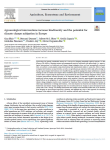Blaix C., Dumont B., Bloor J.M.G., Zagaria C., Fleurance G., Joly F., Huguenin-Elie O. (2026). Agroecological interventions increase biodiversity and the potential for climate change mitigation in Europe. Agriculture, Ecosystems & Environment, 01/01/2026, vol. 395, p. 109938.
https://doi.org/10.1016/j.agee.2025.109938
https://doi.org/10.1016/j.agee.2025.109938
| Titre : | Agroecological interventions increase biodiversity and the potential for climate change mitigation in Europe (2026) |
| Auteurs : | C. Blaix ; B. Dumont ; J.M.G. Bloor ; C. Zagaria ; G. Fleurance ; F. Joly ; O. Huguenin-Elie |
| Type de document : | Article |
| Dans : | Agriculture, Ecosystems & Environment (vol. 395, January 2026) |
| Article en page(s) : | p. 109938 |
| Langues : | Anglais |
| Langues du résumé : | Anglais |
| Catégories : |
Catégories principales 06 - AGRICULTURE. FORÊTS. PÊCHES ; 6.4 - Production Agricole. Système de ProductionThésaurus IAMM AGROECOLOGIE ; BIODIVERSITE ; CHANGEMENT CLIMATIQUE ; EUROPE |
| Résumé : | Agroecology has gained considerable interest as a concept for designing sustainable agrifood systems. To date however, the effects of farming systems and management practices associated with agroecology (i.e., agroecological interventions) on biodiversity and climate change mitigation have not been systematically reviewed. Here, we perform a meta-analysis using observational and experimental studies to assess the effects of agroecological interventions on taxa diversity, as well as on greenhouse gas emissions (GHG) and carbon storage in Europe. Agroecological interventions were classified along a gradient ranging from input substitution to system redesign in order to estimate and compare effects of different agroecological transition types. We found a general positive effect of agroecological interventions across biodiversity and climate change mitigation metrics. Agroecological interventions increased diversity of all functional groups of organisms considered, as well as promoting soil carbon storage, and reducing nitrous oxide emissions. However, agroecological interventions had limited effects on the mitigation of carbon dioxide and methane emissions. Positive effects on biodiversity and climate change mitigation metrics were consistent for transitions from conventional farming interventions to either input substitution or redesign interventions. A win-win situation was found in most studies in which both biodiversity and climate change mitigation data were recorded, driven by changes in micro-decomposer biodiversity and in soil C storage. Our findings demonstrate the multiple environmental benefits that can be obtained from adopting an agroecological approach to farming, and highlight the value of this approach for achieving European Union targets in relation to both GHG emission reduction and biodiversity. |
| Cote : | En ligne |
| URL / DOI : | https://doi.org/10.1016/j.agee.2025.109938 |







